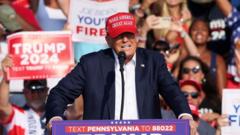In a vigorous response to US President Donald Trump's alarming proposal to impose a staggering 50% import tax on Brazilian goods from August, Brazilian President Luiz Inácio Lula da Silva firmly stated that Brazil is prepared to retaliate with equivalent tariffs. This escalation emerged after Trump expressed grievances over Brazil's treatment of former President Jair Bolsonaro, currently facing a trial for allegedly plotting a coup against Lula following his defeat in the 2022 elections.
Brazil Readies Retaliation Against US Over Proposed Tariffs

Brazil Readies Retaliation Against US Over Proposed Tariffs
Brazilian President Luiz Inácio Lula da Silva pledges to match US tariffs following Donald Trump's threat of a 50% import tax on Brazilian goods.
Trump's support for Bolsonaro, characterized as a "highly respected leader," comes as no surprise given their past alliance. The US president's tariffs, which would disproportionately impact Brazil—its second-largest trade partner—aim to pressure Lula into altering his stance regarding Bolsonaro, whom Trump deems victimized by a "witch hunt." President Lula, however, quickly rebuffed Trump's statements within the context of Brazil's sovereignty, vowing that any unilateral increases in tariffs will be met with corresponding levies on US imports.
While the proposed tariffs pose a significant threat to Brazil's economy, Lula also challenged Trump's claims regarding trade deficits between the two nations, noting that current data reflects a US surplus of $7.4 billion with Brazil. The ironclad trade ties between the two countries involve Brazil exporting gas, petroleum, and coffee, while the US is a key provider of mineral fuels, machinery, and aircraft to Brazil.
In a broader context, Trump’s tariff threats extending to multiple countries may backfire by inadvertently boosting Lula’s domestic support. Political analysts suggest that confrontation with Trump has historically bolstered the popularity of leaders in countries like Mexico and Canada, implying that Lula's successful navigation of this controversy could enhance his political standing domestically.
With both nations entangled in this escalating economic standoff, the ramifications of tariff adjustments remain to be seen, compelling both governments to navigate the complexities of international relations and trade negotiations with care.
While the proposed tariffs pose a significant threat to Brazil's economy, Lula also challenged Trump's claims regarding trade deficits between the two nations, noting that current data reflects a US surplus of $7.4 billion with Brazil. The ironclad trade ties between the two countries involve Brazil exporting gas, petroleum, and coffee, while the US is a key provider of mineral fuels, machinery, and aircraft to Brazil.
In a broader context, Trump’s tariff threats extending to multiple countries may backfire by inadvertently boosting Lula’s domestic support. Political analysts suggest that confrontation with Trump has historically bolstered the popularity of leaders in countries like Mexico and Canada, implying that Lula's successful navigation of this controversy could enhance his political standing domestically.
With both nations entangled in this escalating economic standoff, the ramifications of tariff adjustments remain to be seen, compelling both governments to navigate the complexities of international relations and trade negotiations with care.




















